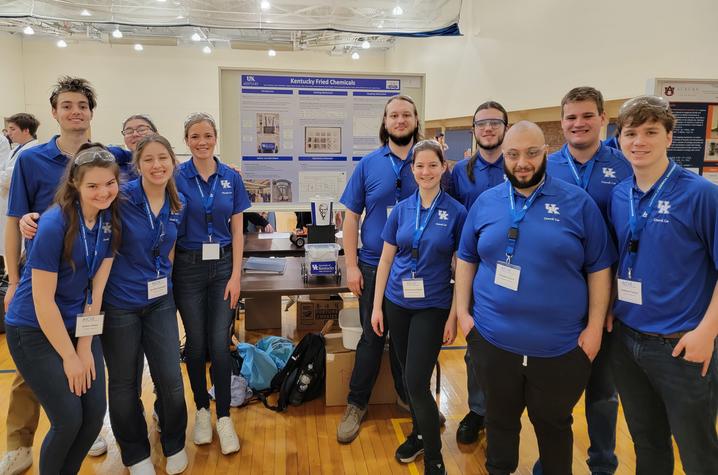UK Engineering’s ChemE Car takes 1st place at regional competition

LEXINGTON, Ky. (March 14, 2023) — The ChemE Car team, housed in the College of Engineering at the University of Kentucky, earned first place for the Southern Region in the American Institute of Chemical Engineers (AIChE) ChemE Car Competition.
The top five teams from the event, hosted by the AlChE chapter at the University of Florida in Gainesville on March 4, advance to compete in the national competition in Orlando in November.
The objective of the competition is for teams to design and construct a small chemical-powered model car that will travel a given distance and stop via chemical reactions. The car must travel anywhere between 15-30 meters in under two minutes. The team that gets closest to the target distance wins. The distance for the competition is announced just one-hour prior to the start time. The distance for this year’s regional competition was 20.13 meters.
The UK ChemE Car, Kentucky Fried Chemicals, stopped just one centimeter from the target distance. For some perspective on the significance of this accomplishment, Anastasia Hauser, faculty advisor and chemical engineering lecturer, shared, “The winner of the national competition last November was 30 centimeters away from the target line.”
Each team gets two runs and the score from the best run is the one recorded. Sarah Caldbeck, team captain and chemical engineering senior, said her team used the two-run format strategically to gain information that led to their first-place victory.
“We used the first run to gather data for the second run and our car stopped 2.33 meters away from the finish line. For the second run, we adjusted our stopping mechanism concentrations and were able to get one centimeter (0.01 m) away from the target distance.”
The team is divided into two interior teams, the starting mechanism team and the stopping mechanism team. The starting mechanism team oversees powering the car and does so with a battery made in a lab using Zinc and Nickel Oxyhydroxide electrodes. The stopping mechanism team must stop the car at the target distance and does this by creating a calibration curve that relates the concentration of the sodium thiosulfate solution to the time it takes for the solution to change colors once hydrochloric acid is added. The opaque solution blocks a laser from reaching a photoresistor, signaling the car to stop.
“The entire team worked diligently to overcome a couple challenges, and we are very proud of their hard work,” Hauser said.
Members of the UK ChemE Car team:
- Sarah Caldbeck, team captain and a senior majoring in chemical engineering, from Philpot, Kentucky;
- Sydney Dendekker, vice president and stopping mechanism lead, a sophomore majoring in materials engineering, from Brentwood, Tennessee;
- Ragaee Daoud, starting mechanism lead and a senior majoring in chemical engineering, from London, Kentucky;
- Brenden King, mechanics and design lead, a junior majoring in chemical engineering, from Owensboro, Kentucky;
- Anthony France, starting mechanism team, a first-year student majoring in chemical engineering, from Loveland, Ohio;
- Thomas Mansfield, starting mechanism team, a first-year student majoring in chemical engineering, from Chesterland, Ohio;
- Johnny Mendel, starting mechanism team, a sophomore majoring in chemical engineering, from Franklin, Kentucky;
- Sam Lowe, starting mechanism team, a first-year student majoring in computer engineering, from Bowling Green, Kentucky;
- Allison Raley, stopping mechanism team, a first-year student majoring in chemical engineering, from Louisville;
- Jennifer Bukowski, stopping mechanism team, a first-year student majoring in chemical engineering, from Lake Zurich, Illinois; and
- Aly Waikel, stopping mechanism team, a first-year student majoring in chemical engineering, from West Chester Township, Ohio.
The ChemE Car Team at UK is open to interested students from all majors. Students who are interested in joining the team can contact Sarah Caldbeck at sarah.caldbeck@uky.edu or Sydney Dendekker at sydney.dendekker@uky.edu for more information.
As the state’s flagship, land-grant institution, the University of Kentucky exists to advance the Commonwealth. We do that by preparing the next generation of leaders — placing students at the heart of everything we do — and transforming the lives of Kentuckians through education, research and creative work, service and health care. We pride ourselves on being a catalyst for breakthroughs and a force for healing, a place where ingenuity unfolds. It's all made possible by our people — visionaries, disruptors and pioneers — who make up 200 academic programs, a $476.5 million research and development enterprise and a world-class medical center, all on one campus.




